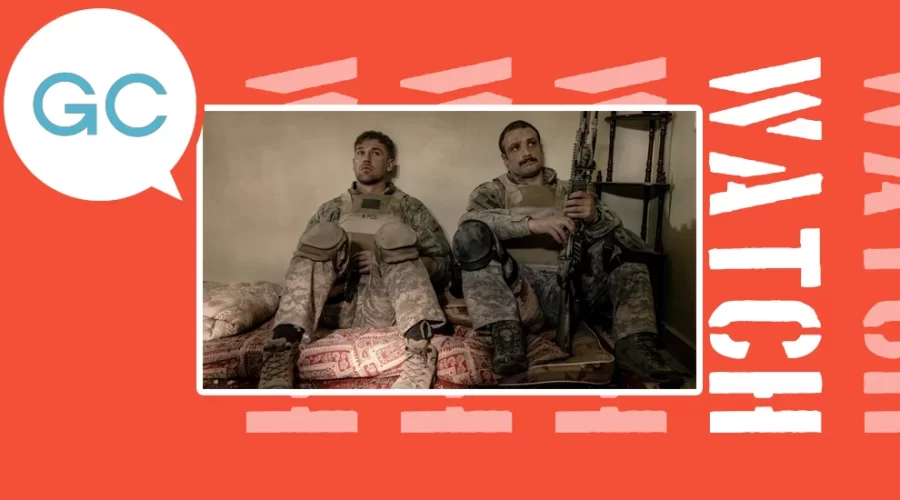With Warfare their companion piece to last year’s best film Civil War, directors Alex Garland and Ray Mendoza have delivered something far more brutal and necessary than another war movie — they have crafted a cinematic trial by fire, a relentless excavation of the human spirit under siege. This is not a story of battles won or heroes made; it is a study in collapse, in futility, and in the terrifying banality of survival. It is a film that understands, at its marrow, Carl von Clausewitz’s bleak observation: “War does not determine who is right – only who is left.”
Garland’s influence is felt in the film’s eerie atmosphere: reality itself seems warped by trauma and exhaustion. Mendoza’s mark is in the rawness of the performances and the almost documentary-like fidelity to the brutal textures of war garnered from the collective memories of his platoon.
Together, they have created something hauntingly elemental — a film where every footstep through the Ramadi streets or movement within the claustrophobic rooms of the house they have occupied, echoes with the knowledge that survival is provisional, and time is both enemy and accomplice.
Clausewitz’s second grim maxim — “War is the domain of physical exertion and suffering” — pulses through every scene. Soldiers limp, drag, and crawl. Their bodies betray them long before any bullet finds its mark. There are no clean deaths in Warfare or stoic endurance of wounds inflicted; for much of the film two men with pulverised legs scream and howl with such deafening abandon that we just want their suffering to stop.
However, the real Pyrrhic victory of Warfare is the exploration of memory. Warfare is dedicated to Mendoza’s comrade Elliott Miller who lost his leg and ability to speak in the small unit action during November in 2006. Elliott had no memory of the action and Garland and Mendoza have crafted a blistering, searing, approximation starring the cream of upcoming male stars in the same vein as The Dirty Dozen. The ensemble cast includes D’Pharaoh Woon-A-Tai as Mendoza, alongside Will Poulter, Cosmo Jarvis, Kit Connor, Finn Bennett, Joseph Quinn, Charles Melton, Noah Centineo, and Michael Gandolfini.
Warfare has ignited Francois Truffaut’s old debate about the futility of trying to make an antiwar film. His much-cited response to Siskel and Ebert said, “Some films claim to be antiwar, but I don’t think I’ve really seen an antiwar film. Every film about war ends up being pro-war.”
Garland and Mendoza wanted to “recreate an incident of warfare” in real time, compressed and external from the larger socio-political context, but even a gruelling, authentic (Mendoza would rightfully question how the audience and this critic would know if Warfare was authentic) war film like Warfare exists in a time where warfare in the Western experience is conducted by fewer and fewer military personnel but collectively remembered by more and more armchair combatants.
The baby-boomer generation were parented by veterans, taught by veterans, and worked alongside veterans. Many stories of World War Two were revealed, many more went to the grave without being told. Real-life veterans like Lee Marvin, Robert Webber, Robert Ryan, Telly Savalas, George Kennedy, Charles Bronson, Ernest Borgnine, and Clint Walker starred in The Dirty Dozen giving a brutal Boys Own adventure some authenticity. There was a tangible human connection to World War Two between parents and children, even if it revealed itself as a clash of ideologies between those two generations. Even prominent artistic Gen Xers like Garland were grandchildren to veterans.
Warfare’s incident occurs only a year before the seminal videogame Call of Duty: Modern Warfare was released, itself a product of countless videos of combat footage from embedded journalists shown 24/7 in the aftermath of 9/11, the subsequent War on Terror and the invasion and occupation of Afghanistan and Iraq. The unreality of war is kept alive by millions of players and the increased militarisation of sporting events and veterans being asked to stand and be applauded during family activities such as Disneyland or Seaworld, the flag poles in gardens, the inexorable proliferation of ‘lest we forget’ tattoos sported by young men and women who have never served in the armed forces create a false memory of combat, a collective lie that in some way we have all served our country in incidents of warfare.
Clausewitz reminds us that war does not care for moral victories, real or otherwise. Garland and Mendoza echo that truth with devastating fidelity.
In the end, Warfare leaves us with a single, searing understanding: in war, survival itself is stripped of meaning, and only the ruins — both human and otherwise — remain to tell the tale.

